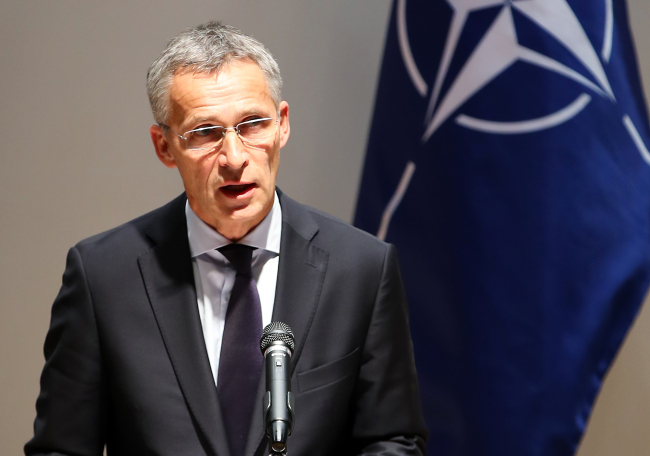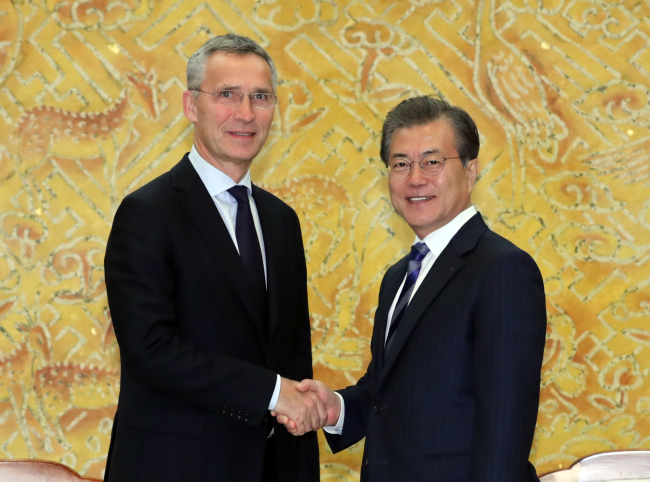‘NATO, Korea partners in universal peacemaking’
“The challenges of the 21st century are too complex for any one nation to face alone.”
By Joel LeePublished : Nov. 6, 2017 - 18:04
In an increasingly complex and interconnected world, the North Atlantic Treaty Organization and South Korea are indispensable partners coping with irreducible challenges across the globe, said the chief of NATO during a visit to Korea last week.
NATO Secretary-General Jens Stoltenberg came to Korea on a two-day trip starting Wednesday to deepen the Euro-Atlantic alliance’s partnership with Seoul. He discussed common security challenges with Korean President Moon Jae-in, Foreign Minister Kang Kyung-wha as well as cabinet ministers and parliamentarians, and together vowed to ratchet up pressure on Pyongyang.
The secretary-general and foreign minister also signed a new partnership program designed to bolster political dialogue and practical cooperation in the nonproliferation of weapons of mass destruction, cyber-defense and counterterrorism, among other areas.
Korea is one of NATO’s “partners across the globe,” which includes Afghanistan, Australia, Colombia, Iraq, Japan, Mongolia, New Zealand and Pakistan.
NATO Secretary-General Jens Stoltenberg came to Korea on a two-day trip starting Wednesday to deepen the Euro-Atlantic alliance’s partnership with Seoul. He discussed common security challenges with Korean President Moon Jae-in, Foreign Minister Kang Kyung-wha as well as cabinet ministers and parliamentarians, and together vowed to ratchet up pressure on Pyongyang.
The secretary-general and foreign minister also signed a new partnership program designed to bolster political dialogue and practical cooperation in the nonproliferation of weapons of mass destruction, cyber-defense and counterterrorism, among other areas.
Korea is one of NATO’s “partners across the globe,” which includes Afghanistan, Australia, Colombia, Iraq, Japan, Mongolia, New Zealand and Pakistan.

The two sides started dialogue and cooperation in 2005, and signed the Individual Partnership and Cooperation Program in September 2012, encompassing political dialogue and technical collaboration in joint priority areas: counterterrorism, multinational peace-support operations, enhancement of interoperability and cooperation under NATO’s Science for Peace and Security Program.
“The challenges of the 21st century are too complex for any one nation to face alone,” Stoltenberg said at a press conference at the Asan Institute for Policy Studies in Seoul on Thursday. “Today, we continue to share strategic interests and concerns. Terrorism, proliferation of weapons of mass destruction, cyberattacks are truly global threats that require a global response.”
The former Norwegian Prime Minister (2000-01, 2005-13) stressed that NATO and its partners are “deeply concerned” by the threats posed by North Korea’s nuclear and ballistic tests. He called the provocations “a clear and present danger to Korea, Japan and our partners in the region and beyond, including those in North America and Europe.”
Highlighting that NATO takes the issue “very seriously,” he said NATO has maintained a strong deterrence posture capable of responding to any aggression, but also that peaceful and negotiated diplomatic resolution of the issue must be sought by all parties as the first resort. Stoltenberg urged the full implementation of United Nations Security Council resolutions for denuclearizing Pyongyang.
“Korea was one of NATO’s first global partners to sign a tailor-made cooperation plan with the alliance in 2012. Since then our cooperation has ranged from Afghanistan to Somalia and from science to cyberspace,” said the politician. “Korea has made outstanding contributions to our mission in Afghanistan in the fight against terrorism, by leading a provincial reconstruction team in the Parwan Province, and contributing $200 million (through the Afghan National Army Trust Fund) to support the Afghan National Army with further pledges made.”

The integrated civilian-military provincial reconstruction team of 470 Korean personnel helped build the Afghan provincial government’s capacity in public health, education, rural development and governance, among others, from 2010 through 2013.
Combating piracy together in the Gulf of Aden in the Horn of Africa region, NATO and Korean naval forces have also safeguarded and secured international waters.
Responding to a question by The Korea Herald on how NATO and Korea could apply lessons learned in fortifying defense capabilities against cyberattacks, Stoltenberg said the two sides could learn from each other, mentioning that NATO has experienced a sharp increase in the number, frequency and depth of electronic attacks against its servers in recent years.
South Korea, too, has borne the brunt of increasing cyberattacks from North Korea in the past few years, as the communist regime has resorted to using advanced cyberwar tactics to gain an upper hand in asymmetrical capabilities and add another twist to its brinksmanship.
“This is about sharing best practices, knowledge and technologies as well as exercising together to identify who’s behind the attacks,” Stoltenberg said, adding Korea will now join NATO’s information-sharing platform against malware attacks, and NATO will work with Korean researchers to develop censors, drones and big data.
According to NATO, the institution is furthering relations with countries with similar strategic concerns and values beyond the Euro-Atlantic area. The Alliance’s Strategic Concept adopted at the 2010 Lisbon Summit has paved the way for a “more flexible” partnership policy, offering all partners the same basis for cooperation and dialogue. Korea’s program with NATO allows access to a wide range of activities with alliance members and formalize relations with them.

Analysts have pointed out that NATO’s strategic boundary over the years has broadened from the Euro-Atlantic arena to the global arena. Former Korean Foreign Minister Yun Byung-se said that as the world has moved from the Cold War epoch to the post-Cold War era of globalization, NATO’s stage has expanded from Europe to the world over, including Libya and Afghanistan.
“Its agenda now covers not only traditional security issues, but also nontraditional security issues such as countering weapons of mass destruction, terrorism, cyber warfare and piracy. NATO is going beyond its traditional role of a transatlantic security organization and assuming the role of a global security provider,” he said in a speech at the Security Talks at the Prince Carl Palace event in Munich, Germany, in February last year.
“More than ever before, crises and conflicts are becoming boundless and borderless. However, I believe that such a complex and interconnected security environment is actually creating more space for NATO and Korea to maneuver them together in different ways. After all we share the Eurasian continent from the eastern and western ends.”
Underscoring NATO’s role as a security bulwark during the German reunification process, which ushered in peace and prosperity across Europe, Yun said NATO and Korea -- who share core values of democracy, human rights and the rule of law -- could join forces to facilitate the unification of the Korean Peninsula for peace and prosperity of the larger world.
By Joel Lee (joel@heraldcorp.com)








![[Graphic News] More Koreans say they plan long-distance trips this year](http://res.heraldm.com/phpwas/restmb_idxmake.php?idx=644&simg=/content/image/2024/04/17/20240417050828_0.gif&u=)
![[KH Explains] Hyundai's full hybrid edge to pay off amid slow transition to pure EVs](http://res.heraldm.com/phpwas/restmb_idxmake.php?idx=644&simg=/content/image/2024/04/18/20240418050645_0.jpg&u=20240419100350)





![[From the Scene] Monks, Buddhists hail return of remains of Buddhas](http://res.heraldm.com/phpwas/restmb_idxmake.php?idx=652&simg=/content/image/2024/04/19/20240419050617_0.jpg&u=20240419175937)

![[KH Explains] Hyundai's full hybrid edge to pay off amid slow transition to pure EVs](http://res.heraldm.com/phpwas/restmb_idxmake.php?idx=652&simg=/content/image/2024/04/18/20240418050645_0.jpg&u=20240419100350)

![[Today’s K-pop] Illit drops debut single remix](http://res.heraldm.com/phpwas/restmb_idxmake.php?idx=642&simg=/content/image/2024/04/19/20240419050612_0.jpg&u=)